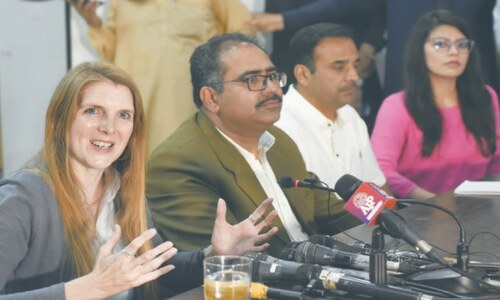ISLAMABAD: Pakistan’s first ever Environment Barometer survey cited high temperature, water scarcity and air pollution as top three environmental challenges Pakistan is facing.
Regarding provincial government’s efforts to address these challenges, 40pc respondents from Khyber Pakhtunkhwa (KP) believed that their government took some measures to tackle these challenges, followed by Punjab with 28pc respondents, Sindh with 26pc and Balochistan with 20 pc.
The survey was jointly conducted by Sustainable Development Policy Institute (SDPI) and Herald magazine to assess people’s perceptions on environmental issues and government’s role in environmental sphere.
Presenting the findings of the survey, SDPI Executive Director Dr Abid Qayyum Suleri said the barometer was aimed at assessing people’s perceptions about environmental issues.
According to the survey, 89pc of the respondents believed that these environmental issues are negatively impacting their health, 74pc said they are affecting their livelihood and 68pc believed that their day to day social life was negatively impacted by the issues.
Only 4pc of the respondents were satisfied with their respective provincial governments’ measures.
Also, voters’ response on the environment as a determinant for their vote in the coming election was depressing, where only 13pc respondents prioritise environment as a determinant for casting their vote.
As per the survey, 87pc respondents believed that human activities are largely responsible for these environmental issues, 75pc blamed on natural causes and 74pc found population growth as a major factor.
Associate Research Fellow at SDPI Dr Shafqat Munir said the Environment Barometer showed the awareness level of the voters on environmental issues seems high, majority of them did not include environmental issues as determinant for voting in the 2018 elections.
He said rising awareness may play a key role in future to include environment on the priorities’ list of the people while pushing for their demands in terms of allocations in budget and electing representatives.
Meanwhile, during an event held on World Brain Day (WBD) at Shifa International Hospital, Consultant Neurologist Prof Dr Arsalan Ahmad said in recent times, the effects of air pollution on our health has attracted increasing interest with international institutions providing growing mortality and morbidity data.
The latest estimate of deaths attributable to air pollution worldwide is nine million annually.
These deaths are related to cardiac diseases such as myocardial infarction or congestive heart failure, neurological events such as stroke, lung diseases and cancer.
This year’s theme for WBD is ‘Clean Air for Healthy Brain’.
Long-term exposure to relatively high levels of certain chemicals in workplace air has resulted in nervous system damage over the past century.
In addition to air pollution, occupational and residential air pollution and water pollution may also be an emerging issue.
Published in Dawn, July 22nd, 2018














































Dear visitor, the comments section is undergoing an overhaul and will return soon.